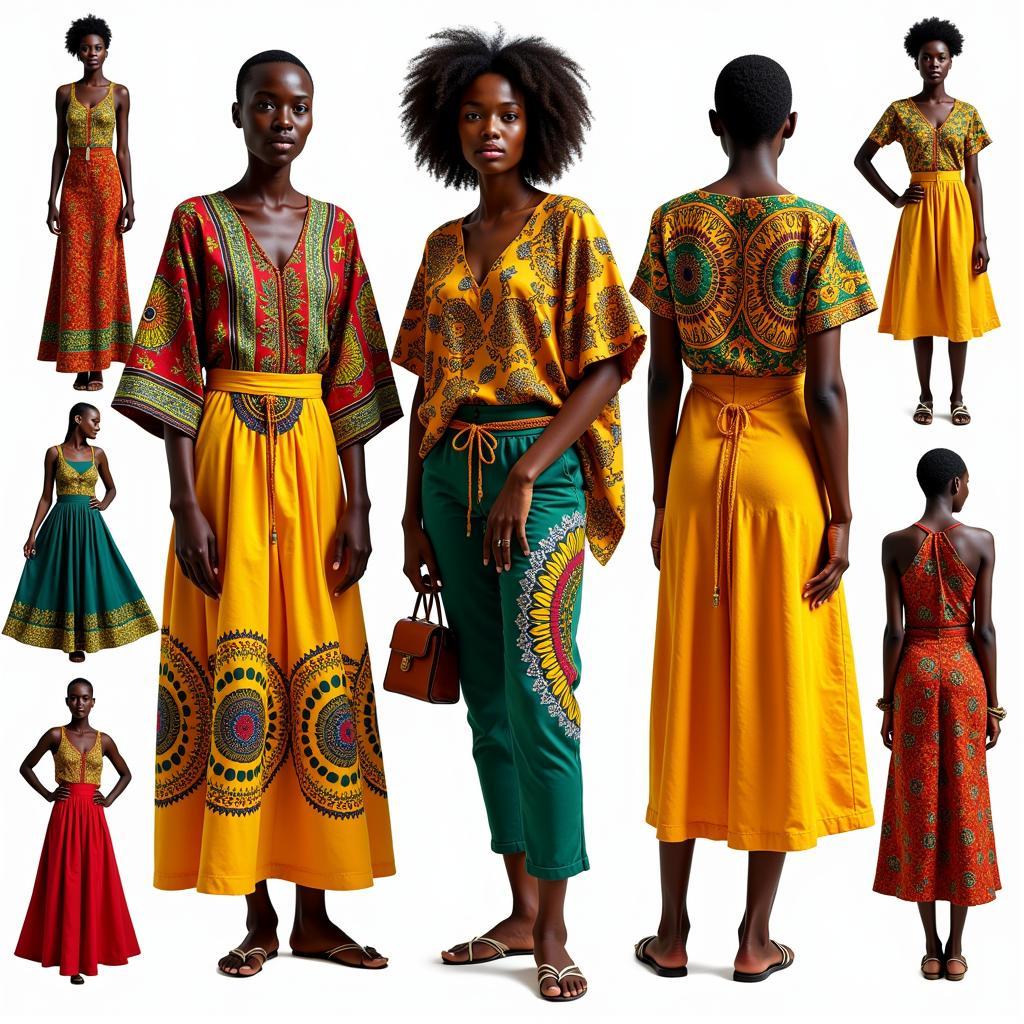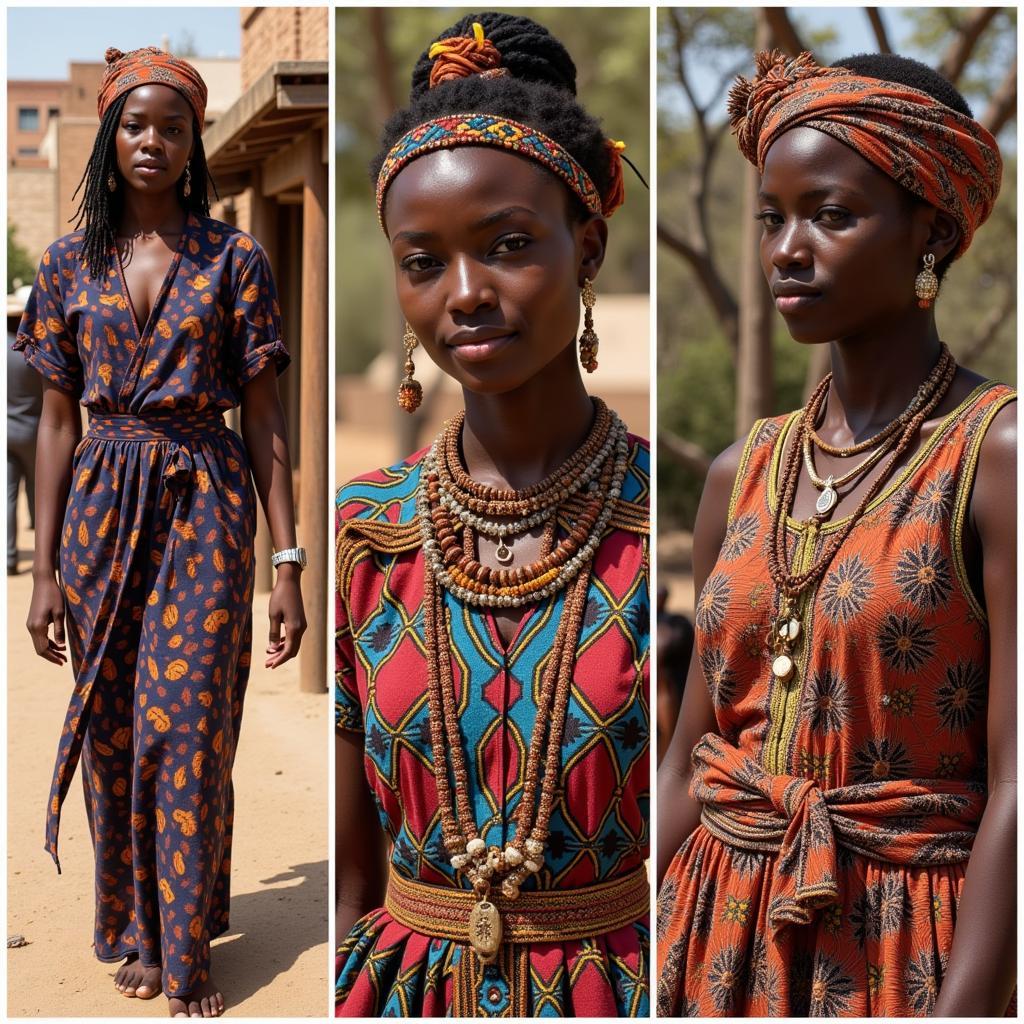Exploring the Rich Tapestry of African Ethnic Clothing
African Ethnic Clothing is more than just fabric and thread; it’s a vibrant expression of culture, history, and identity. From the intricate patterns of the Kente cloth to the flowing robes of the Maasai, each garment tells a story, reflecting the diverse traditions and artistic ingenuity of the African continent. This exploration delves into the fascinating world of African ethnic clothing, showcasing its beauty, significance, and evolution.
A Journey Through the History of African Ethnic Clothing
African clothing traditions have deep roots, stretching back centuries. Initially, materials like barkcloth, animal hides, and raffia were used. As trade routes developed, access to cotton, silk, and other fabrics transformed clothing styles and techniques. The introduction of new materials didn’t erase the older traditions; rather, it led to a beautiful fusion, with traditional motifs and techniques being adapted to new materials. For example, the intricate weaving techniques used for raffia were later applied to cotton and silk, creating exquisite textiles. These textiles served not only as clothing but also as status symbols, reflecting social standing and wealth. After this brief history introduction, let’s talk a bit about African dress designs and their impact on modern fashion. You can find more inspiration about dresses on this website: african dress designs.
The Significance of Color and Symbolism in African Ethnic Clothing
Color plays a pivotal role in African ethnic clothing, often holding deep symbolic meaning. For instance, red might represent power and vitality in one culture, while in another, it could symbolize mourning or sacrifice. Similarly, patterns and motifs woven into the fabric can convey messages about ancestry, social status, or spiritual beliefs. The Adinkra symbols of the Akan people of Ghana, for example, are rich with meaning, each symbol representing a proverb or concept. These symbols are often incorporated into Kente cloth, adding another layer of significance to the garment. The use of such symbols underscores the importance of storytelling and cultural preservation through clothing. Have you ever considered the cultural significance behind African earring designs? They often incorporate similar symbolism. Learn more here: african earring designs.
What do the different colors in African clothing symbolize?
Many colors hold symbolic meaning: red can signify power, white can represent purity, and green can symbolize growth and prosperity, although interpretations can vary by region and culture.
 African Clothing Color Symbolism
African Clothing Color Symbolism
African Ethnic Clothing in the Modern World
Today, African ethnic clothing continues to evolve, blending tradition with contemporary influences. Designers are reimagining traditional styles, incorporating them into modern fashion, and showcasing them on global runways. This has led to a renewed appreciation for African textiles and craftsmanship. From everyday wear to special occasion attire, African ethnic clothing is embraced both within the continent and internationally. The growing popularity of African fashion reflects a global interest in cultural diversity and the unique aesthetic of African designs. Looking for inspiration for a special occasion? Check out these stylish African groom model ideas: african groom model.
How has African ethnic clothing influenced modern fashion?
African textiles, patterns, and silhouettes have inspired numerous designers worldwide, leading to the incorporation of African elements into contemporary fashion, promoting a global appreciation for African aesthetics.
Regional Variations in African Ethnic Clothing
The vastness of the African continent translates into a wide array of clothing styles, each reflecting the unique environment and cultural heritage of its region. The flowing robes of North Africa, often adorned with intricate embroidery, contrast sharply with the brightly colored Kente cloth of West Africa. The beaded jewelry and elaborate headdresses of East Africa tell yet another story. Exploring these regional variations offers a glimpse into the rich tapestry of African culture.
 African Clothing Regional Variations
African Clothing Regional Variations
“African clothing is a powerful statement of identity, reflecting the wearer’s heritage and connection to their community,” says Anika Nkosi, a renowned textile historian specializing in African traditions.
Conclusion: Celebrating the Timeless Elegance of African Ethnic Clothing
African ethnic clothing is a testament to the creativity, resilience, and cultural richness of the African people. From its historical significance to its contemporary adaptations, it continues to captivate and inspire. By understanding the stories woven into the fabric, we gain a deeper appreciation for the vibrant tapestry of African culture. As we’ve explored, African ethnic clothing offers a powerful lens through which to view the continent’s diverse history, traditions, and artistic expression. If you are interested in exploring more representation of African beauty, you can check out resources like african american full body mannequin. This might give you more insights into how African forms are celebrated in art and fashion.
FAQ
- What is the most popular African ethnic clothing? This is subjective and varies by region, but Kente cloth, Dashikis, and various beaded garments are widely recognized.
- Where can I buy authentic African ethnic clothing? You can find authentic pieces online, in specialty stores, and during travels to African countries. Supporting local artisans is crucial.
- How do I care for African ethnic clothing? Care instructions depend on the fabric and embellishments. Always check the label for specific recommendations.
- Can I wear African ethnic clothing if I am not African? Absolutely! Appreciating and respectfully wearing other cultures’ clothing is a way to celebrate diversity.
- What are some common misconceptions about African ethnic clothing? One common misconception is that it is homogenous. In reality, it is incredibly diverse, reflecting the many cultures across the continent.
- Are there specific occasions for wearing certain types of African ethnic clothing? Yes, some garments are reserved for ceremonies, festivals, or other special occasions.
- How can I learn more about the history and significance of specific African ethnic clothing styles? Research online, visit museums, and consult books on African textiles and culture.
“The beauty of African fashion lies in its ability to transcend time, connecting generations through shared traditions and artistic expression,” adds Dr. Kwame Asante, a cultural anthropologist with extensive research on African art and symbolism.
Common Situations and Questions
- Wedding Attire: What are appropriate African ethnic clothing options for a wedding guest or the bridal party?
- Everyday Wear: How can I incorporate African ethnic clothing into my everyday wardrobe?
- Festivals and Celebrations: What are traditional garments worn during specific African festivals or cultural celebrations?
- Gift Giving: What are some meaningful African ethnic clothing items to give as gifts?
- Cultural Sensitivity: How can I ensure I am wearing African ethnic clothing respectfully and appropriately?
Further Exploration
You might also be interested in learning about african booty babes.
Contact Us
For further assistance or inquiries, please contact us at: Phone: +255768904061, Email: kaka.mag@gmail.com, or visit our office at Mbarali DC Mawindi, Kangaga, Tanzania. Our customer service team is available 24/7.

